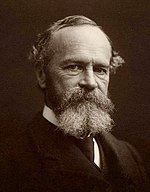Introduction to Psychology 1/IPSY101/History/Functionalism
| “ | The greatest discovery of my generation is that a human being can alter his life by altering his attitudes. | ” |
| —William James | ||
William James (1842–1910) was the first North American psychologist who espoused a different perspective on how psychology should operate.
James was introduced to Darwin’s theory of evolution by natural selection and accepted it as an explanation of an organism’s characteristics. Key to that theory is the idea that natural selection leads to organisms that are adapted to their environment, including their behaviour. Adaptation means that a trait of an organism has a function for the survival and reproduction of the individual, because it has been naturally selected.
As James saw it, psychology’s purpose was to study the function of behaviour in the world, and as such, his perspective was known as functionalism. Functionalism focused on how mental activities helped an organism fit into its environment. Functionalism has a second, more subtle meaning in that functionalists were more interested in the operation of the whole mind rather than of its individual parts, which were the focus of structuralism.
Like Wundt, James believed that introspection could serve as one means by which someone might study mental activities, but James also relied on more objective measures, including the use of various recording devices, and examinations of concrete products of mental activities and of anatomy and physiology (Gordon, 1995[1]).
One of James’ students, Mary Whiton Calkins, went on to become the first woman to serve as president of the American Psychological Association.
References
- ↑ Gordon, O. E. (1995). A brief history of psychology. Retrieved from http://www.psych.utah.edu/gordon/Classes/Psy4905Docs/PsychHistory/index.html#maptop
- Source
- This page was proudly adapted from Psychology published by OpenStax CNX. Oct 31, 2016 under a Creative Commons Attribution 4.0 license. Download for free at http://cnx.org/contents/4abf04bf-93a0-45c3-9cbc-2cefd46e68cc@5.52.


